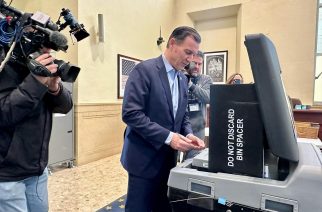
President Barack Obama has tapped a prosecutor in the Oklahoma City bombing case for the vacant seat on the Supreme Court.
Obama on Wednesday nominated Merrick Garland, the chief judge of the U.S. Court of Appeals, Washington D.C. Circuit, to fill the seat left vacant after the sudden death of Justice Antonin Scalia last month.
The New York State Bar Association is urging the U.S. Senate to take up Garland’s confirmation proceedings as soon as possible.
“President Obama has fulfilled his constitutional duty by nominating a candidate to fill a vacancy on the Supreme Court. The Senate should now fulfill its duty and act on the nominee as soon as possible,” said Association President David Miranda. “A delay in filling the ninth seat on the nation’s highest court will impact the court’s ability to resolve disputes when the justices are split 4-4.

Garland
Garland, a graduate of Harvard Law School, was appointed by President Bill Clinton to the D.C. Court of Appeals in 1997, and approved by a 76-23 vote. Since 2013, he has served as the chief judge on that court, which many consider to be the most important appellate court in the nation.
Born and raised in Illinois, Garland said being nominated by the president — “a fellow Chicagoan — is an honor.”
After graduating law school, Garland clerked for Second Circuit Judge Henry Friendly, and later worked for Supreme Court Justice William Brennan. After a short stint in private law doing pro bono work, Garland accepted a job as a federal prosecutor under President George H.W. Bush. He then joined the Department of Justice, working under the Attorney General.
During this time, Garland oversaw some of the most significant prosecutions in the 1990s, including his arduous work on the Oklahoma City bombing of 1995. Garland moved to Oklahoma in the days following the attack, and led the investigation and prosecution of Timothy McVeigh and Terry Nichols.
When Garland was appointed to the D.C. Circuit Court, his nomination was met with overwhelming bipartisan support from senators and other lawmakers. He is known for being a “meticulous judge with a knack for building consensus, playing it straight, and deciding every case based on what the law requires,” according to a press release from the White House.
Garland has said “the role of the court is to apply the law to the facts of the case before it — not to legislate, no to arrogate to itself the executive power, not to hand down advisory opinions on the issues of the day.”
Garland became choked up during the nomination announcement today in the Rose Garden, comparing that honor to when his wife, Lynn, agreed to marry him. Garland and his wife of nearly 30 years, have two daughters together, Becky and Jessie.
The nomination comes amid Republican claims that the next justice of the Supreme Court should be nominated by the president-elect chosen later this year. Senate Majority Leader Mitch McConnell reiterated his vow to not consider a nominee chosen by President Obama. “It’s about a principle and not a person… it seems President Obama made this nomination not with the intent with seeing a nominee confirmed, but in order to politicize it for the purposes of the election.”
President Obama addressed the partisan issue during his nomination speech Wednesday morning, saying “To suggest that someone as qualified and respected as Merrick Garland doesn’t even deserve a hearing, let alone an up or down vote, to join an institution as important as our Supreme Court, when two- thirds of Americans believe otherwise, that would be unprecedented.”
Small business owners in New York were among the first to react to the news.
The New York state chapter of the National Federation of Independent Business is weighing in on the nomination — the first time in the group’s 73-year history.
“After preliminary examination, Judge Garland’s record is discouraging,” said NFIB New York’s Director Mike Durant. “He has frequently sided with regulators, labor unions and trial lawyers at the expense of small businesses. Ninety-one percent of our members believe that NFIB should be involved with this process. The stakes are far too high for small businesses in New York for NFIB to sit on the sidelines.”









